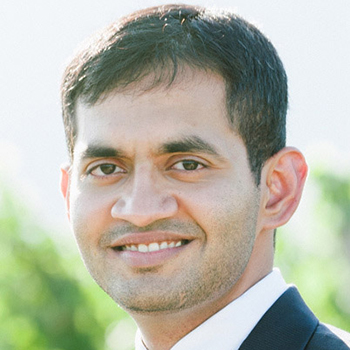Purushottam Dixit: Understanding How Biological Networks Evolve, Organize, and Make Robust Decisions in the Presence of Variability
Yale Engineering is proud to welcome its newest faculty for the 2023-24 academic year. These six new faculty members – with more to be announced soon – mark the continued growth of the School and investment in the research areas illustrated in the SEAS Strategic Vision.
The latest faculty arrivals are valuable additions to the applied physics, biomedical, and mechanical engineering and materials science departments. Their expertise includes machine learning, artificial intelligence, atomic engineering, quantum computing, photon physics, neuroscience, and biological networks.
Upon their arrival, we asked these new faculty members questions about their work, their motivations, potential collaborations, and much more:

Purushottam Dixit, Biomedical Engineering
Hometown?
I was born and brought up in the city of Bombay (now Mumbai) in India and with some minor excursions remained there till the end of my undergraduate degree. I then moved to Baltimore for graduate work and New York City for a postdoc. New York felt like home thanks to the chaos and noise that I was familiar with growing up in Bombay. I am excited to move back to the northeast where I have spent most of my adult life.
Prior academic history?
I did my undergraduate degree in Chemical Engineering at the Indian Institute of Technology, Bombay. Then I moved to Baltimore for a PhD in Chemical and Biomolecular Engineering at the Johns Hopkins University. I was then a postdoc at the Brookhaven National Laboratory and Columbia University. Prior to joining Yale, I was a faculty in the Department of Physics at the University of Florida.
How would you summarize your research?
Variability and uncertainty are salient features biological systems, ranging from proteins who need to remain stable in the presence of thermal noise to ecosystems that experience rapid environmental changes. Our lab is interested in understanding how biological networks evolve, organize, and make robust decisions in the presence of variability. Our lab works on building computational models to understand network dynamics across multiple time and length scales, ranging from nanoscale protein machines to macroscale ecologies. A main thrust in the lab is developing biophysically inspired machine learning methods to integrate high dimensional data with mechanistic models for novel discovery.
What inspired you to choose this field of study?
It took me some time to arrive at my current research program. As an undergraduate, I did an internship at the Max Planck Institute in biophysics of protein folding. This experience led me to do my doctoral work at the microscopic scale, exploring protein biophysics from the quantum chemical to the macromolecular scale. My doctoral stint, though productive, was scientifically dissatisfying due to a lack of contact with experiments. In my postdoctoral career, I realized that the interface between biophysics and systems biology offered an ideal mix of theory, computation, and back-and-forth with experiments. This is exactly the interface where my lab’s research takes place.
Where do you see the field 10 years from now?
Thanks to the omics revolution, the quality and quantity of data being collected about biological systems is only going to get better in the next decade. Moreover, these systems are governed by biophysical constraints. Therefore, rational understanding of phenomena and design of rational intervention will require interfacing machine learning methods with biophysical models. I believe that the next decade will see computational methods becoming an integral component of biological research.
What brought you to Yale?
The excellent systems biology and biophysics environment at Yale, the collaborative nature of scientists, and the institute structure at the West Campus were all very attractive to grow a collaborative research program. Coming back to the northeast is a big plus!
What areas outside of Biomedical Engineering do you seek to create impactful research collaborations or partnerships?
Systems Biology Institute, Microbial Sciences Institute, Physics, Quantitative Biology Institute
Are there any courses that you look forward to teaching/creating?
I am planning to create and teach a course on mathematical models of biological networks. What I am most excited about is to explore how biological interactions across different length and time scales can be described by common mathematical frameworks.
What are your interests outside of the lab?
Cooking, hiking, running, and making elaborate cocktails.
What is the best New Haven Pizza?
I like pineapple on my pizza, so I am definitely here for a fight!
Follow Purushottam Dixit on Twitter @pddixit

